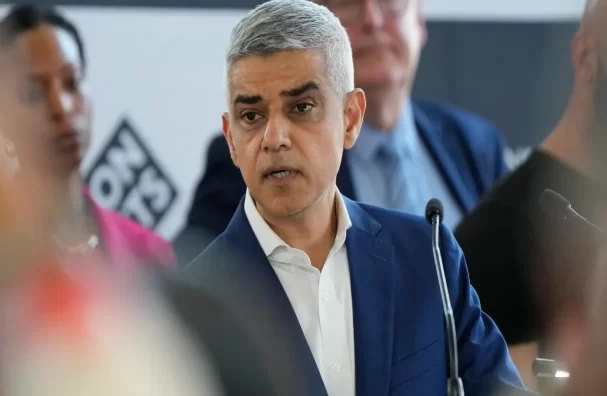
As the results poured in, it became increasingly evident that the British electorate had grown weary of the Conservative Party’s tumultuous tenure. Labour leader Keir Starmer hailed the party’s performance as “phenomenal” and “beyond expectations,” citing the public’s frustration with the “chaos and decline” under the Tories.
The opposition party’s victories extended far beyond London, with Labour clinching several high-profile mayoral races and securing substantial gains in local council seats. Notably, the West Midlands region witnessed a shocking upset, with Labour’s Richard Parker unseating the incumbent Conservative mayor, Andy Street, in a closely contested battle.
At the heart of Labour’s success lies Sadiq Khan’s resounding victory in London. The 53-year-old politician, who made history as the first Muslim mayor of a Western capital city in 2016, secured a comfortable 11-point lead over his Conservative challenger, Susan Hall, dashing the Tories’ hopes of reclaiming control of the UK’s capital.
Khan’s triumph is a testament to his enduring popularity among Londoners, who have embraced his inclusive leadership and progressive agenda. In his victory speech, he celebrated the city’s diversity as “an almighty strength” and vowed to reject right-wing populism, striking a chord with the cosmopolitan values that define London’s identity.
For Prime Minister Rishi Sunak and the Conservative Party, the local election results have dealt a severe blow, amplifying the challenges they face in regaining public trust. Aside from Ben Houchen’s narrow victory in Tees Valley, the Tories struggled to secure notable wins, with the party finishing a distant third in numerous local council tallies, losing nearly 500 seats.
Sunak, who had acknowledged voters’ frustration prior to the elections, now finds himself under immense pressure to chart a new course for his party. In a bid to downplay the losses, he argued that Labour’s gains were not necessarily indicative of their chances in a general election, asserting that the Conservatives still have “everything to fight for.”
However, the scale of the Tory defeat has fueled speculation about potential leadership challenges, with some critics urging Sunak to adopt a more muscular conservative approach to revive the party’s fortunes.
As the dust settles on the local elections, Labour’s resounding performance has emboldened Starmer’s calls for an early general election. With the party enjoying a consistent double-digit lead in national polls for over 18 months, the opposition leader has seized the opportunity to demand that Sunak seek a fresh mandate from the electorate.
While Sunak is not obligated to call a general election until January 2024, the pressure on him to do so earlier is likely to intensify, especially if Labour’s momentum continues to build. The local election results have undoubtedly provided a significant boost to the opposition party’s confidence, setting the stage for an intense political battle in the months ahead.
As the focus shifts to the looming general election, both Labour and the Conservatives face significant challenges and opportunities. For Labour, the task at hand is to maintain their newfound momentum and translate their local successes into a compelling national narrative that resonates with voters across the country.
Conversely, the Conservatives must grapple with the fallout from their dismal performance and devise a strategy to regain the trust of an increasingly disillusioned electorate. Whether this entails a leadership change or a significant policy shift remains to be seen, but the urgency to address the party’s woes is undeniable.
The local election results have far-reaching implications for Britain’s political landscape, signaling a potential seismic shift in the balance of power. If Labour’s success is replicated in a general election, it could pave the way for a new era of governance, with Starmer’s party poised to implement its vision for the country.
Conversely, a Conservative victory would likely herald a continuation of the party’s current trajectory, albeit with potential adjustments to address the concerns raised by voters during the local elections.
As the campaign season unfolds, several key issues are likely to take center stage, shaping the narrative and influencing voter sentiment. The cost of living crisis, which has been a persistent concern for many Britons, is expected to feature prominently in the debates, with both parties vying to present credible solutions to alleviate economic pressures.
Additionally, the state of public services, including healthcare, education, and infrastructure, will undoubtedly be a focal point, as voters scrutinize each party’s track record and proposals for improvement.
In an era where political discourse is often polarized and divisive, the ability of both Labour and the Conservatives to effectively communicate their vision and connect with voters will be crucial. Effective messaging, coupled with a clear understanding of the electorate’s concerns, could prove pivotal in swaying undecided voters and solidifying support among core constituencies.
Grassroots mobilization and voter turnout will play a pivotal role in determining the outcome of the general election. Both parties will be tasked with energizing their respective bases and reaching out to disengaged or undecided voters, underscoring the importance of robust ground games and targeted outreach efforts.
The outcome of the general election will have far-reaching consequences beyond Britain’s domestic affairs. The country’s global standing, its relationships with key allies and trading partners, and its approach to pressing international issues such as climate change and security will all be shaped by the victorious party’s agenda.
As the campaign season progresses, it is crucial for both Labour and the Conservatives to remain agile and adaptable, responding to shifting public sentiment and emerging issues with deft and nuanced strategies. The ability to pivot and adjust course in response to unforeseen developments could prove decisive in the quest for electoral success.
